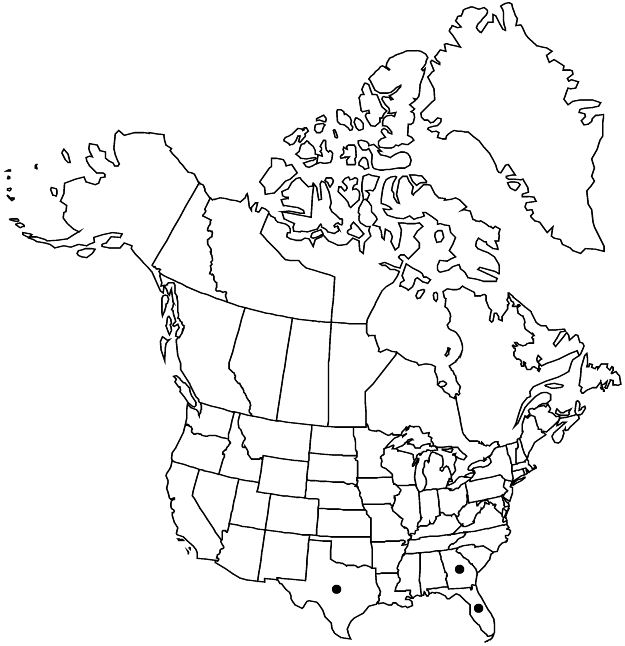Difference between revisions of "Pavonia hastata"
Diss. 3: 138, plate 47, fig. 2. 1787.
FNA>Volume Importer |
imported>Volume Importer |
||
| (6 intermediate revisions by 2 users not shown) | |||
| Line 16: | Line 16: | ||
|name=Malva lecontei | |name=Malva lecontei | ||
|authority=Buckley | |authority=Buckley | ||
| − | }}{{Treatment/ID/Synonym | + | |rank=species |
| + | }} {{Treatment/ID/Synonym | ||
|name=Pavonia jonesii | |name=Pavonia jonesii | ||
|authority=Feay ex Alph. Wood | |authority=Feay ex Alph. Wood | ||
| − | }}{{Treatment/ID/Synonym | + | |rank=species |
| + | }} {{Treatment/ID/Synonym | ||
|name=P. lecontei | |name=P. lecontei | ||
|authority=(Buckley) Torrey & A. Gray | |authority=(Buckley) Torrey & A. Gray | ||
| + | |rank=species | ||
}} | }} | ||
|hierarchy=Malvaceae;Malvaceae subfam. Malvoideae;Pavonia;Pavonia hastata | |hierarchy=Malvaceae;Malvaceae subfam. Malvoideae;Pavonia;Pavonia hastata | ||
| Line 37: | Line 40: | ||
|elevation=100 m | |elevation=100 m | ||
|distribution=Fla.;Ga.;Tex.;South America (Argentina;Brazil;Paraguay;Uruguay);introduced also in Mexico;Australia. | |distribution=Fla.;Ga.;Tex.;South America (Argentina;Brazil;Paraguay;Uruguay);introduced also in Mexico;Australia. | ||
| − | |discussion=<p>Pavonia hastata is often cultivated and has escaped in limited areas. The flowers appear to be seasonally cleistogamous, and these are usually not present when chasmogamous flowers predominate.</p> | + | |introduced=true |
| + | |discussion=<p><i>Pavonia hastata</i> is often cultivated and has escaped in limited areas. The flowers appear to be seasonally cleistogamous, and these are usually not present when chasmogamous flowers predominate.</p> | ||
|tables= | |tables= | ||
|references= | |references= | ||
| Line 46: | Line 50: | ||
-->{{#Taxon: | -->{{#Taxon: | ||
name=Pavonia hastata | name=Pavonia hastata | ||
| − | |||
|authority=Cavanilles | |authority=Cavanilles | ||
|rank=species | |rank=species | ||
| Line 62: | Line 65: | ||
|publication year=1787 | |publication year=1787 | ||
|special status=Introduced | |special status=Introduced | ||
| − | |source xml=https:// | + | |source xml=https://bitbucket.org/aafc-mbb/fna-data-curation/src/2e0870ddd59836b60bcf96646a41e87ea5a5943a/coarse_grained_fna_xml/V6/V6_556.xml |
|subfamily=Malvaceae subfam. Malvoideae | |subfamily=Malvaceae subfam. Malvoideae | ||
|genus=Pavonia | |genus=Pavonia | ||
Latest revision as of 22:22, 5 November 2020
Subshrubs, 0.5 m. Stems stellate-hairy, hairs 0.1 mm. Leaves: stipules subulate, 2 mm; petiole to 1/3 length of blade; blade discolorous, ovate-triangular to hastate-oblong, to 7 cm, base cordate, margins coarsely crenate, apex column with 5 apical teeth, glabrous; stigmas included, glabrous; flowers sometimes cleistogamous, smaller, petals shorter than calyx, stamens 5. Schizocarps pale green, maturing dark brown to ± black, 6 mm diam., puberulent; mericarps without spines, dorsally keeled, 4 mm, reticulate-costate. Seeds minutely puberulent. 2n = 56.
Phenology: Flowering spring–fall.
Habitat: Sandy soil on coastal plains
Elevation: 100 m
Distribution

Introduced; Fla., Ga., Tex., South America (Argentina, Brazil, Paraguay, Uruguay), introduced also in Mexico, Australia.
Discussion
Pavonia hastata is often cultivated and has escaped in limited areas. The flowers appear to be seasonally cleistogamous, and these are usually not present when chasmogamous flowers predominate.
Selected References
None.